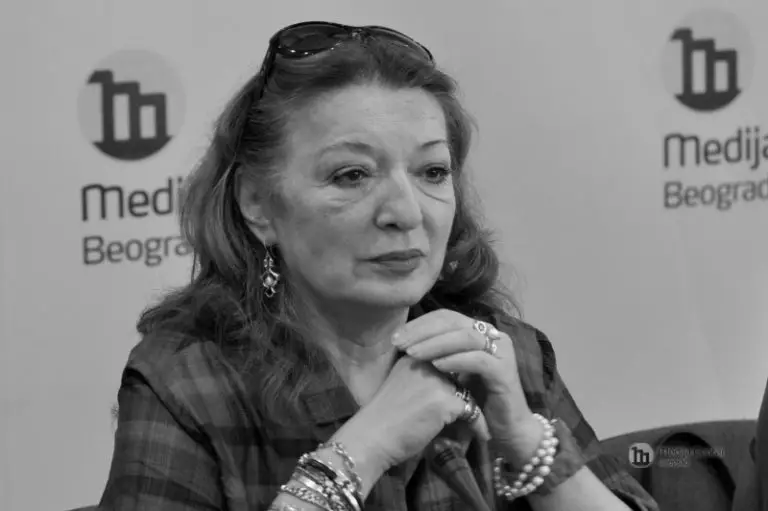OBITUARY
Nadežda Gaće
1950-2025

FRONT PAGE FOR NADEŽDA GAĆE
(instead of the Saturday telephone conversation)
A magician with words, thoughts, analyses, and communication. Sharp, bold, courageous, benevolent, wise and charming, often playfully adolescent, maintaining high moral and professional standards; a conversationalist who listens and responds with both her mind and heart. When she criticises, it is always reasoned. Above all, a journalist, one of the most significant and influential women in Serbian journalism and former Yugoslavia. Her belief in journalism as a calling and as an essential corrective in every democratic society, which implies responsibility towards both the individual and society, was unwavering. Precisely because of her, and those like her in journalistic spirit and pen—many of whom are here today at this farewell for Nadežda Gaća—real journalism survived despite all challenges and threats. I speak of her persistence, perseverance, courage, and even stubbornness when needed, in never abandoning professional ethics and standards. Although I am not from that profession, as a citizen, reader, and friend, I feel deep gratitude for this. It has been a privilege to be friends with Nadežda. Talking with her enriches both mind and soul. Listening to her often brought comfort to the spirit. Life allowed me the privilege to be among those fortunate, at least during the last decade of her earthly life.
I do not speak of Nadežda in the past tense—and yet I began this address aware that no word I say will be the right one, encompassing everything needed, fully conscious that words alone cannot dispel the emptiness left behind her. Words fall short of what heart and mind wish to testify, and thus, what cannot be expressed when it comes to her will remain somewhere deep within us, becoming an internal strength for moments when Nadežda’s voice would have been necessary—moments that will undoubtedly come.
It was said long ago that after one’s earthly departure, a person continues to live for as long as they remain alive in the memories of those who knew them, while their work endures even longer—if there are people ready and capable of continuing it. I am certain it will be so in her case.
I know, I feel, that she is here with us today, and that it pleases her. She would be touched to see us all here, hers in one way or another, gathered together, and that our sadness is softened by the love and pride in knowing that we were her contemporaries and had the privilege to spend some time with her.
Her courage was not loud. There was none of that chest-beating so typical of many cowardly acts we frequently witness. She simply persisted with unreal determination and superhuman strength, which I admired deeply. She dealt with her illness through diligent work, the care of those close to her, responsible adherence to therapy, but also by a particular kind of ignoring—never allowing illness to exclude her from life’s flow and reality. She read obsessively, followed the news, analysed, reflected, wrote, and advised… We discussed many phenomena and people, but illness was among the rare topics of our conversations. Usually, Saturday morning—the very time I am writing this eulogy—was our slot for a phone call during the years of her illness. She would briefly say: “Skip the illness questions; you know it all already, and it’s not important. Go straight to geopolitics. Actually, hold on—is everything that happened here on Wednesday, Thursday, Friday normal to you? Is such behaviour normal?” Satisfied with my reply—that much of it indeed wasn’t normal—she would continue the conversation, analysing reality and foreign newspaper articles, sharing insights from her close colleagues and friends Jelka, Mijat, Moma, Sonja, Branka, Duda, and all others whom she respected and loved. She listened attentively to younger colleagues. Those debates, which she said inspired her work, coupled with her thoughts, knowledge, and masterful pen, produced many of Nadežda’s sharp and timeless texts. I would like to end by sharing a quote from one such text, published last October:
“We entered the 21st century as a world full of hope that conflicts and wars were behind us, that technology would serve humanity, that Europe would strengthen and expand, and that the number of states living in prosperity and peace would increase. Instead, we received conflicts so intense that neither a global nor nuclear war seems unrealistic any longer. We’ve received unimaginable inequality among individuals and nations, the transformation of states into branches of powerful corporations, elections worldwide reduced mostly to choosing the lesser evil, politics turned from long-term visions into short-term gains for a small minority, and media becoming mere cheerleaders for these elites.”
As you can see, even within these lines she mentions inequality, and topics of human rights, their violation, social, gender, and other inequalities, and the difficult position of marginalised groups always had a prominent place in her Novi Magazin. I would like that to remain so. As for us, women—I need not even mention how, as editor, she opened and wrote about topics unjustifiably undervalued and neglected by society. Nadežda Gaće was aware of that and consequently provided significant space in her magazine, both cover pages and inner pages, for female voices and the much-needed women’s perspective on various issues and phenomena. For that too, I thank her.
I wish time had been kinder to Nadežda, and that she could still be choosing magazine covers…
May her memory be eternal.
by Brankica Janković
Commissioner for Protection of Equality